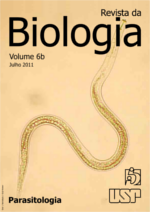Visceral leishmaniasis and genetic susceptibility
DOI:
https://doi.org/10.7594/revbio.6b.05Keywords:
Visceral leishmaniasis, genetic polymorphism, candidate genes, immunogeneticAbstract
Visceral leishmaniasis is a serious infectious disease caused by an obligate intracellular protozoan of the genus Leishmania. The disease encompasses a wide spectrum of clinical manifestations, which can range from asymptomatic cases, to the classical form of the disease characterized by hepatosplenomegaly, fever and wasting, and even the more severe bleeding that can progress to death. Some factors can alter the severity of clinical manifestations, among them the genetic predisposition. Through research of genetic polymorphism it is possible to evaluate which genes may be related to susceptibility to infection and predisposition to the most severe forms of the diseaseDownloads
Download data is not yet available.
Downloads
Published
2018-04-23
Issue
Section
Revisão
License
We ensure that our journal does not retain any copyright and that these are exclusive of the author(s) of the text. In that sense, we intend to break any restrictions to the published material and to achieve more intensely our goal of communicating science.
How to Cite
Frade, A. F. (2018). Visceral leishmaniasis and genetic susceptibility. Revista Da Biologia, 6(2), 22-25. https://doi.org/10.7594/revbio.6b.05






